Hospitality Management: Paradigms and Impacts Report
VerifiedAdded on 2023/01/23
|20
|6109
|94
Report
AI Summary
This report delves into the evolving landscape of hospitality management, focusing on alternative paradigms and their influence on future construct development. It examines the shifts in hotel ownership, the rise of online reservation systems, and the emergence of diverse lodging options, all of which have introduced new complexities to the industry. The report explores key themes like eco-awareness, wellness, and sustainability, highlighting the importance of product and service innovation, data-driven personalization, and the adaptation to new market demands. It analyzes the impacts of these paradigms on travel patterns, consumer interactions, and technological advancements. The report also discusses the challenges and opportunities presented by these changes, offering insights into how the hospitality sector can adapt to the changing needs of travelers and the broader trends shaping the industry. This report, available on Desklib, offers valuable insights for students of hospitality management.
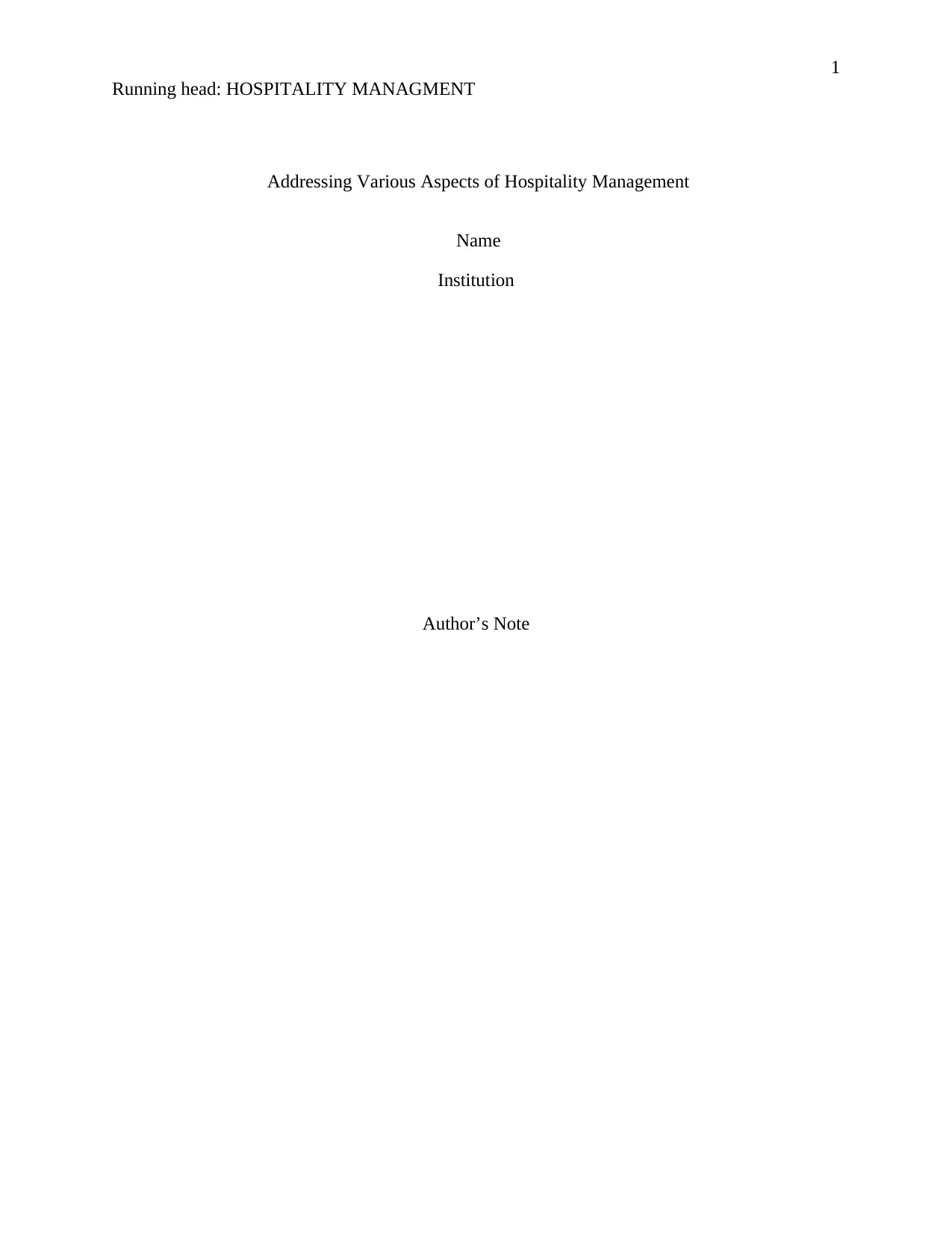
1
Running head: HOSPITALITY MANAGMENT
Addressing Various Aspects of Hospitality Management
Name
Institution
Author’s Note
Running head: HOSPITALITY MANAGMENT
Addressing Various Aspects of Hospitality Management
Name
Institution
Author’s Note
Paraphrase This Document
Need a fresh take? Get an instant paraphrase of this document with our AI Paraphraser
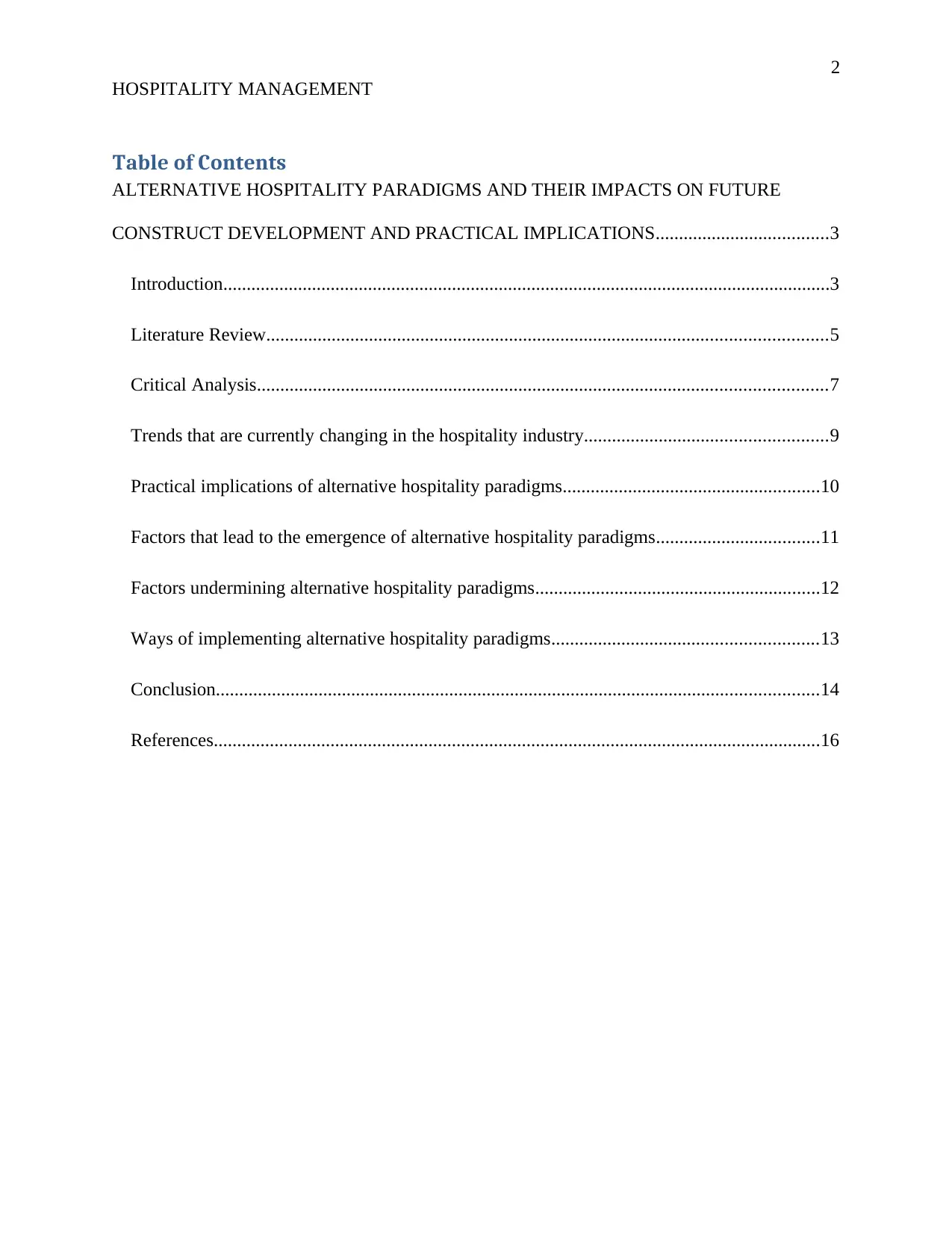
2
HOSPITALITY MANAGEMENT
Table of Contents
ALTERNATIVE HOSPITALITY PARADIGMS AND THEIR IMPACTS ON FUTURE
CONSTRUCT DEVELOPMENT AND PRACTICAL IMPLICATIONS.....................................3
Introduction..................................................................................................................................3
Literature Review........................................................................................................................5
Critical Analysis..........................................................................................................................7
Trends that are currently changing in the hospitality industry....................................................9
Practical implications of alternative hospitality paradigms.......................................................10
Factors that lead to the emergence of alternative hospitality paradigms...................................11
Factors undermining alternative hospitality paradigms.............................................................12
Ways of implementing alternative hospitality paradigms.........................................................13
Conclusion.................................................................................................................................14
References..................................................................................................................................16
HOSPITALITY MANAGEMENT
Table of Contents
ALTERNATIVE HOSPITALITY PARADIGMS AND THEIR IMPACTS ON FUTURE
CONSTRUCT DEVELOPMENT AND PRACTICAL IMPLICATIONS.....................................3
Introduction..................................................................................................................................3
Literature Review........................................................................................................................5
Critical Analysis..........................................................................................................................7
Trends that are currently changing in the hospitality industry....................................................9
Practical implications of alternative hospitality paradigms.......................................................10
Factors that lead to the emergence of alternative hospitality paradigms...................................11
Factors undermining alternative hospitality paradigms.............................................................12
Ways of implementing alternative hospitality paradigms.........................................................13
Conclusion.................................................................................................................................14
References..................................................................................................................................16
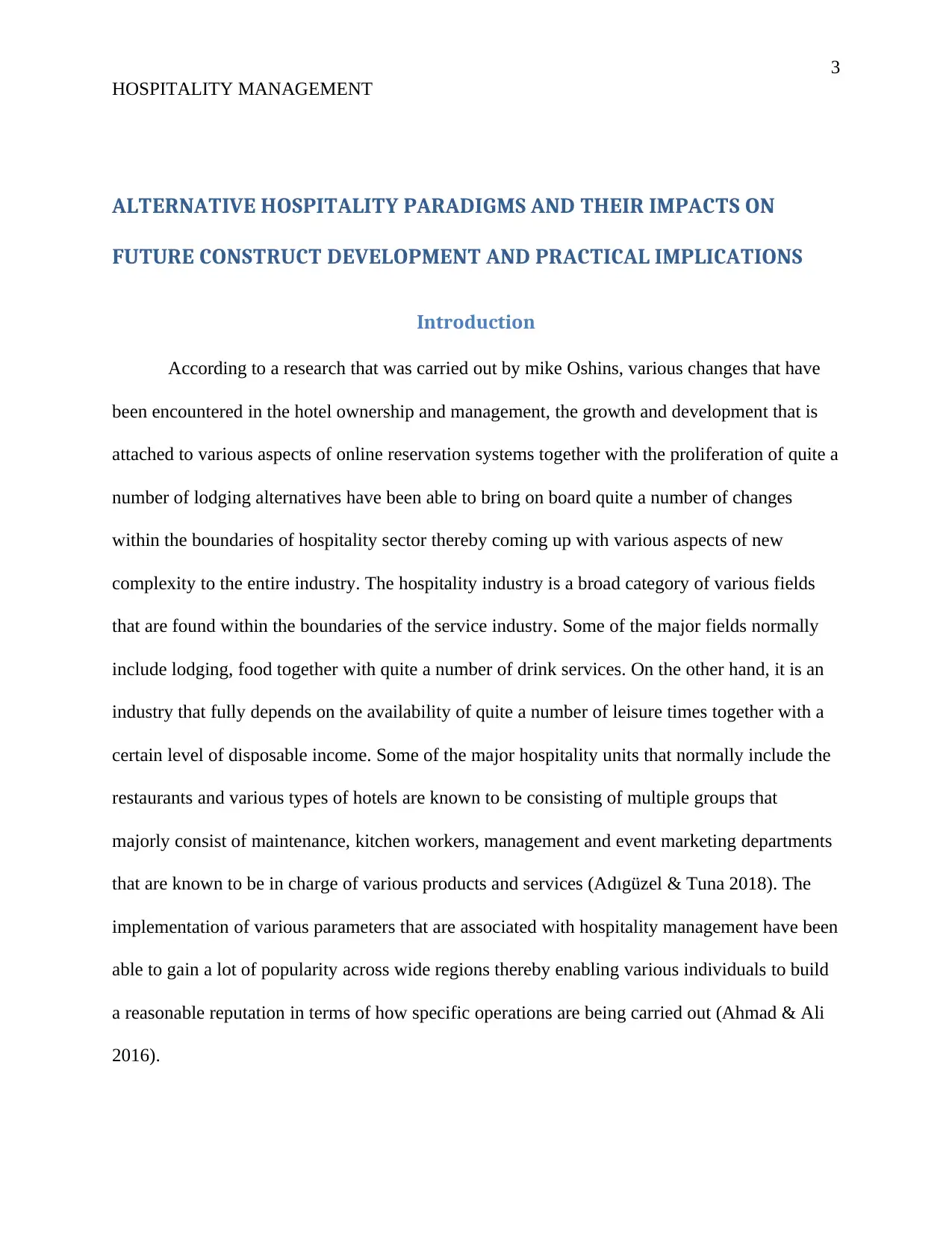
3
HOSPITALITY MANAGEMENT
ALTERNATIVE HOSPITALITY PARADIGMS AND THEIR IMPACTS ON
FUTURE CONSTRUCT DEVELOPMENT AND PRACTICAL IMPLICATIONS
Introduction
According to a research that was carried out by mike Oshins, various changes that have
been encountered in the hotel ownership and management, the growth and development that is
attached to various aspects of online reservation systems together with the proliferation of quite a
number of lodging alternatives have been able to bring on board quite a number of changes
within the boundaries of hospitality sector thereby coming up with various aspects of new
complexity to the entire industry. The hospitality industry is a broad category of various fields
that are found within the boundaries of the service industry. Some of the major fields normally
include lodging, food together with quite a number of drink services. On the other hand, it is an
industry that fully depends on the availability of quite a number of leisure times together with a
certain level of disposable income. Some of the major hospitality units that normally include the
restaurants and various types of hotels are known to be consisting of multiple groups that
majorly consist of maintenance, kitchen workers, management and event marketing departments
that are known to be in charge of various products and services (Adıgüzel & Tuna 2018). The
implementation of various parameters that are associated with hospitality management have been
able to gain a lot of popularity across wide regions thereby enabling various individuals to build
a reasonable reputation in terms of how specific operations are being carried out (Ahmad & Ali
2016).
HOSPITALITY MANAGEMENT
ALTERNATIVE HOSPITALITY PARADIGMS AND THEIR IMPACTS ON
FUTURE CONSTRUCT DEVELOPMENT AND PRACTICAL IMPLICATIONS
Introduction
According to a research that was carried out by mike Oshins, various changes that have
been encountered in the hotel ownership and management, the growth and development that is
attached to various aspects of online reservation systems together with the proliferation of quite a
number of lodging alternatives have been able to bring on board quite a number of changes
within the boundaries of hospitality sector thereby coming up with various aspects of new
complexity to the entire industry. The hospitality industry is a broad category of various fields
that are found within the boundaries of the service industry. Some of the major fields normally
include lodging, food together with quite a number of drink services. On the other hand, it is an
industry that fully depends on the availability of quite a number of leisure times together with a
certain level of disposable income. Some of the major hospitality units that normally include the
restaurants and various types of hotels are known to be consisting of multiple groups that
majorly consist of maintenance, kitchen workers, management and event marketing departments
that are known to be in charge of various products and services (Adıgüzel & Tuna 2018). The
implementation of various parameters that are associated with hospitality management have been
able to gain a lot of popularity across wide regions thereby enabling various individuals to build
a reasonable reputation in terms of how specific operations are being carried out (Ahmad & Ali
2016).
⊘ This is a preview!⊘
Do you want full access?
Subscribe today to unlock all pages.

Trusted by 1+ million students worldwide
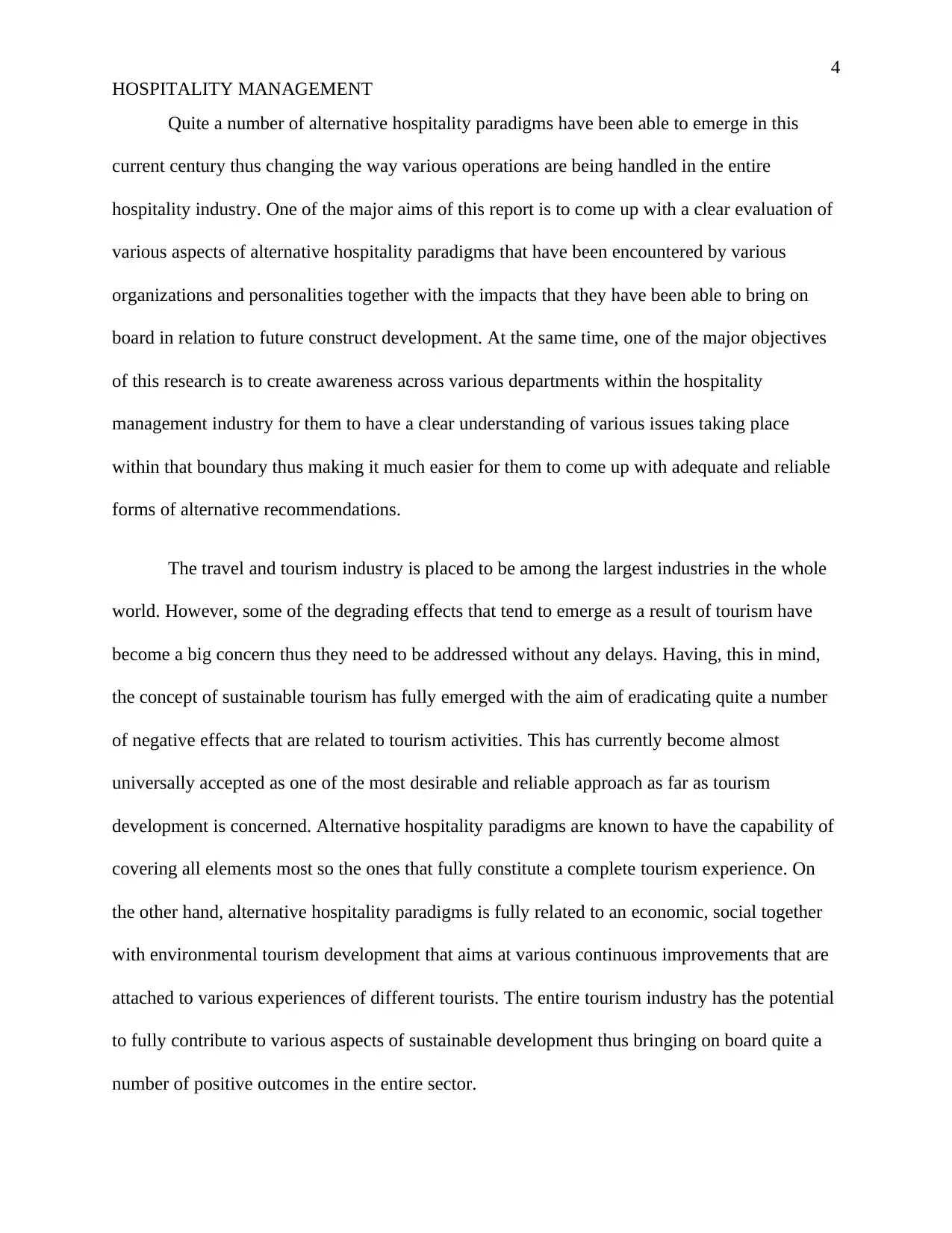
4
HOSPITALITY MANAGEMENT
Quite a number of alternative hospitality paradigms have been able to emerge in this
current century thus changing the way various operations are being handled in the entire
hospitality industry. One of the major aims of this report is to come up with a clear evaluation of
various aspects of alternative hospitality paradigms that have been encountered by various
organizations and personalities together with the impacts that they have been able to bring on
board in relation to future construct development. At the same time, one of the major objectives
of this research is to create awareness across various departments within the hospitality
management industry for them to have a clear understanding of various issues taking place
within that boundary thus making it much easier for them to come up with adequate and reliable
forms of alternative recommendations.
The travel and tourism industry is placed to be among the largest industries in the whole
world. However, some of the degrading effects that tend to emerge as a result of tourism have
become a big concern thus they need to be addressed without any delays. Having, this in mind,
the concept of sustainable tourism has fully emerged with the aim of eradicating quite a number
of negative effects that are related to tourism activities. This has currently become almost
universally accepted as one of the most desirable and reliable approach as far as tourism
development is concerned. Alternative hospitality paradigms are known to have the capability of
covering all elements most so the ones that fully constitute a complete tourism experience. On
the other hand, alternative hospitality paradigms is fully related to an economic, social together
with environmental tourism development that aims at various continuous improvements that are
attached to various experiences of different tourists. The entire tourism industry has the potential
to fully contribute to various aspects of sustainable development thus bringing on board quite a
number of positive outcomes in the entire sector.
HOSPITALITY MANAGEMENT
Quite a number of alternative hospitality paradigms have been able to emerge in this
current century thus changing the way various operations are being handled in the entire
hospitality industry. One of the major aims of this report is to come up with a clear evaluation of
various aspects of alternative hospitality paradigms that have been encountered by various
organizations and personalities together with the impacts that they have been able to bring on
board in relation to future construct development. At the same time, one of the major objectives
of this research is to create awareness across various departments within the hospitality
management industry for them to have a clear understanding of various issues taking place
within that boundary thus making it much easier for them to come up with adequate and reliable
forms of alternative recommendations.
The travel and tourism industry is placed to be among the largest industries in the whole
world. However, some of the degrading effects that tend to emerge as a result of tourism have
become a big concern thus they need to be addressed without any delays. Having, this in mind,
the concept of sustainable tourism has fully emerged with the aim of eradicating quite a number
of negative effects that are related to tourism activities. This has currently become almost
universally accepted as one of the most desirable and reliable approach as far as tourism
development is concerned. Alternative hospitality paradigms are known to have the capability of
covering all elements most so the ones that fully constitute a complete tourism experience. On
the other hand, alternative hospitality paradigms is fully related to an economic, social together
with environmental tourism development that aims at various continuous improvements that are
attached to various experiences of different tourists. The entire tourism industry has the potential
to fully contribute to various aspects of sustainable development thus bringing on board quite a
number of positive outcomes in the entire sector.
Paraphrase This Document
Need a fresh take? Get an instant paraphrase of this document with our AI Paraphraser
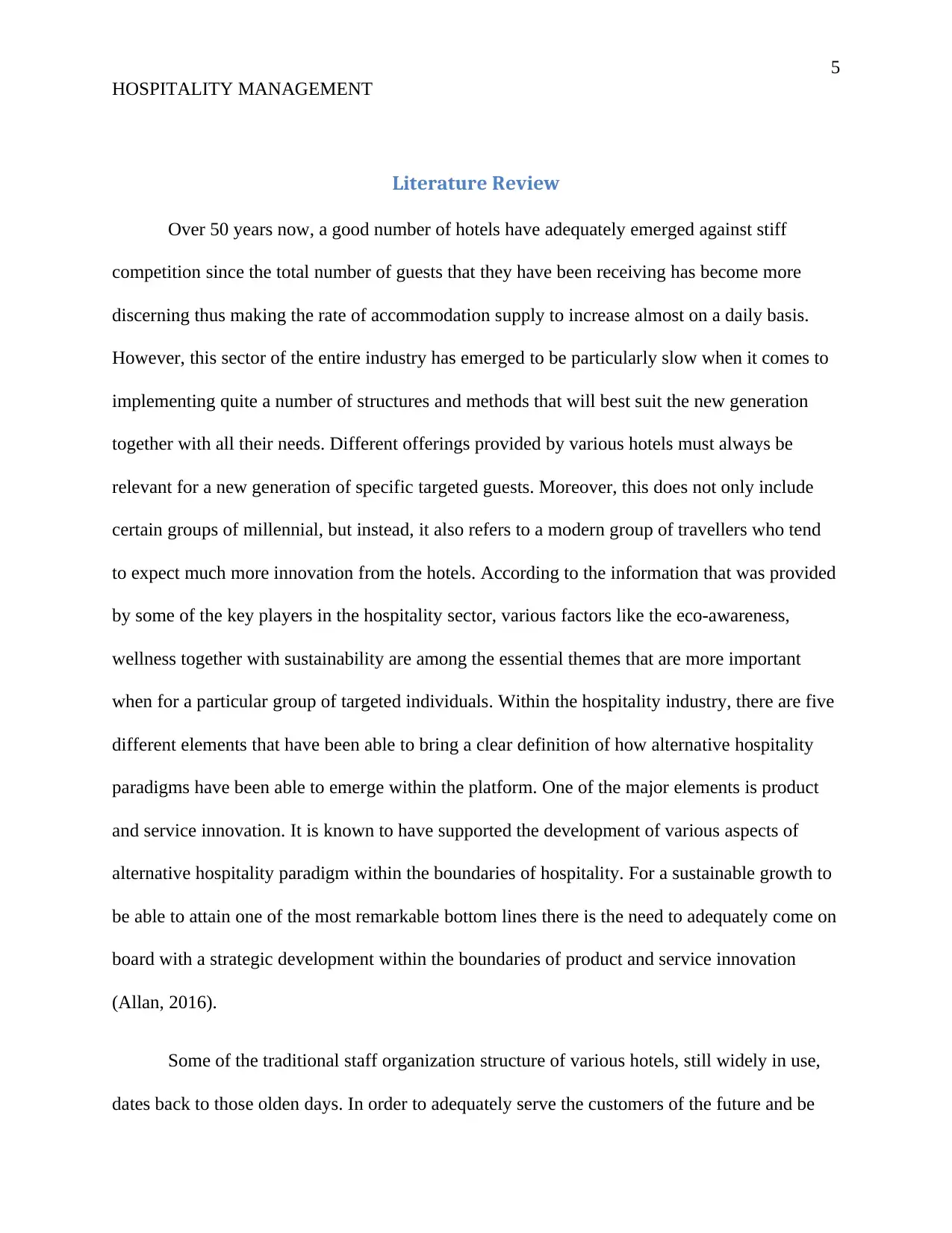
5
HOSPITALITY MANAGEMENT
Literature Review
Over 50 years now, a good number of hotels have adequately emerged against stiff
competition since the total number of guests that they have been receiving has become more
discerning thus making the rate of accommodation supply to increase almost on a daily basis.
However, this sector of the entire industry has emerged to be particularly slow when it comes to
implementing quite a number of structures and methods that will best suit the new generation
together with all their needs. Different offerings provided by various hotels must always be
relevant for a new generation of specific targeted guests. Moreover, this does not only include
certain groups of millennial, but instead, it also refers to a modern group of travellers who tend
to expect much more innovation from the hotels. According to the information that was provided
by some of the key players in the hospitality sector, various factors like the eco-awareness,
wellness together with sustainability are among the essential themes that are more important
when for a particular group of targeted individuals. Within the hospitality industry, there are five
different elements that have been able to bring a clear definition of how alternative hospitality
paradigms have been able to emerge within the platform. One of the major elements is product
and service innovation. It is known to have supported the development of various aspects of
alternative hospitality paradigm within the boundaries of hospitality. For a sustainable growth to
be able to attain one of the most remarkable bottom lines there is the need to adequately come on
board with a strategic development within the boundaries of product and service innovation
(Allan, 2016).
Some of the traditional staff organization structure of various hotels, still widely in use,
dates back to those olden days. In order to adequately serve the customers of the future and be
HOSPITALITY MANAGEMENT
Literature Review
Over 50 years now, a good number of hotels have adequately emerged against stiff
competition since the total number of guests that they have been receiving has become more
discerning thus making the rate of accommodation supply to increase almost on a daily basis.
However, this sector of the entire industry has emerged to be particularly slow when it comes to
implementing quite a number of structures and methods that will best suit the new generation
together with all their needs. Different offerings provided by various hotels must always be
relevant for a new generation of specific targeted guests. Moreover, this does not only include
certain groups of millennial, but instead, it also refers to a modern group of travellers who tend
to expect much more innovation from the hotels. According to the information that was provided
by some of the key players in the hospitality sector, various factors like the eco-awareness,
wellness together with sustainability are among the essential themes that are more important
when for a particular group of targeted individuals. Within the hospitality industry, there are five
different elements that have been able to bring a clear definition of how alternative hospitality
paradigms have been able to emerge within the platform. One of the major elements is product
and service innovation. It is known to have supported the development of various aspects of
alternative hospitality paradigm within the boundaries of hospitality. For a sustainable growth to
be able to attain one of the most remarkable bottom lines there is the need to adequately come on
board with a strategic development within the boundaries of product and service innovation
(Allan, 2016).
Some of the traditional staff organization structure of various hotels, still widely in use,
dates back to those olden days. In order to adequately serve the customers of the future and be
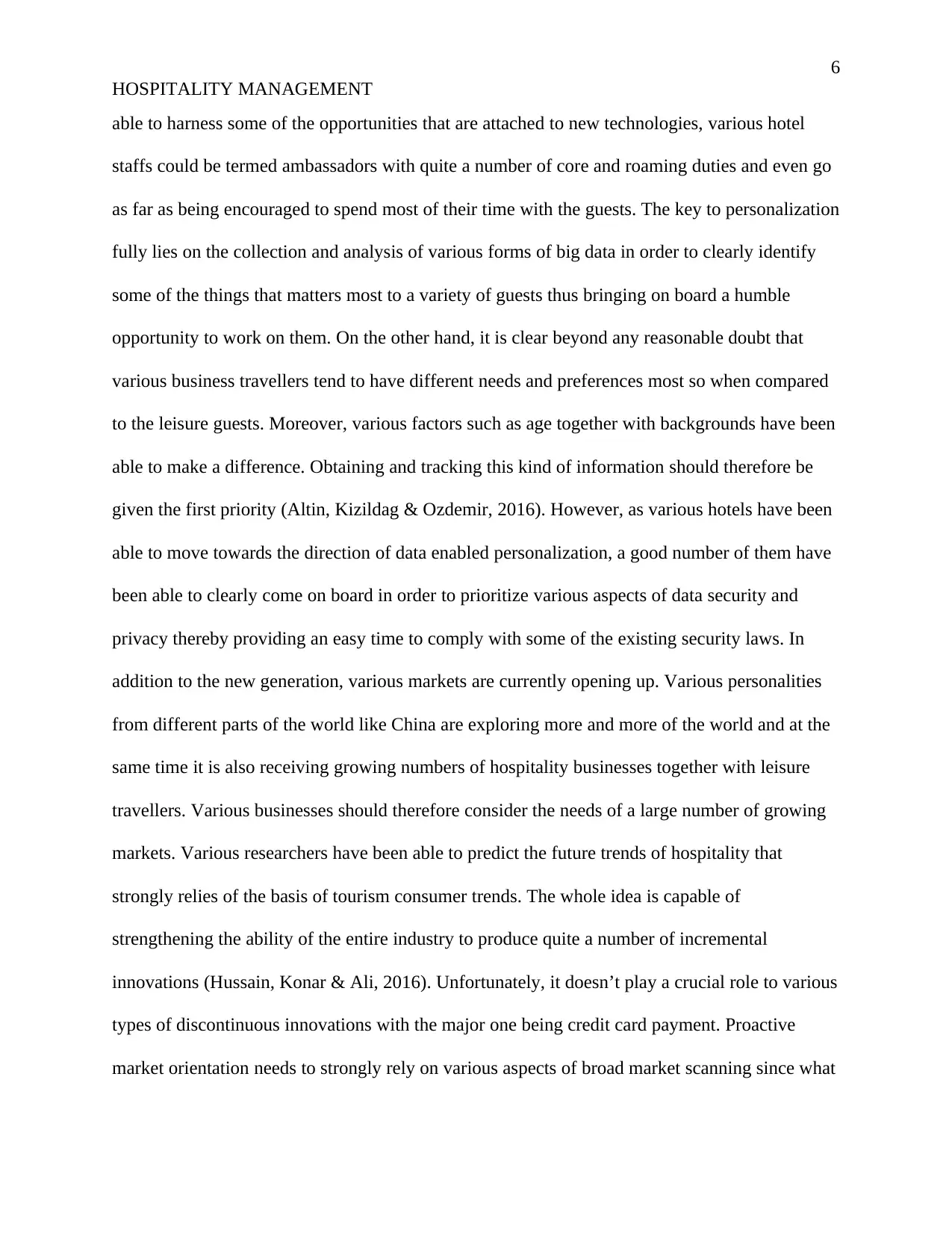
6
HOSPITALITY MANAGEMENT
able to harness some of the opportunities that are attached to new technologies, various hotel
staffs could be termed ambassadors with quite a number of core and roaming duties and even go
as far as being encouraged to spend most of their time with the guests. The key to personalization
fully lies on the collection and analysis of various forms of big data in order to clearly identify
some of the things that matters most to a variety of guests thus bringing on board a humble
opportunity to work on them. On the other hand, it is clear beyond any reasonable doubt that
various business travellers tend to have different needs and preferences most so when compared
to the leisure guests. Moreover, various factors such as age together with backgrounds have been
able to make a difference. Obtaining and tracking this kind of information should therefore be
given the first priority (Altin, Kizildag & Ozdemir, 2016). However, as various hotels have been
able to move towards the direction of data enabled personalization, a good number of them have
been able to clearly come on board in order to prioritize various aspects of data security and
privacy thereby providing an easy time to comply with some of the existing security laws. In
addition to the new generation, various markets are currently opening up. Various personalities
from different parts of the world like China are exploring more and more of the world and at the
same time it is also receiving growing numbers of hospitality businesses together with leisure
travellers. Various businesses should therefore consider the needs of a large number of growing
markets. Various researchers have been able to predict the future trends of hospitality that
strongly relies of the basis of tourism consumer trends. The whole idea is capable of
strengthening the ability of the entire industry to produce quite a number of incremental
innovations (Hussain, Konar & Ali, 2016). Unfortunately, it doesn’t play a crucial role to various
types of discontinuous innovations with the major one being credit card payment. Proactive
market orientation needs to strongly rely on various aspects of broad market scanning since what
HOSPITALITY MANAGEMENT
able to harness some of the opportunities that are attached to new technologies, various hotel
staffs could be termed ambassadors with quite a number of core and roaming duties and even go
as far as being encouraged to spend most of their time with the guests. The key to personalization
fully lies on the collection and analysis of various forms of big data in order to clearly identify
some of the things that matters most to a variety of guests thus bringing on board a humble
opportunity to work on them. On the other hand, it is clear beyond any reasonable doubt that
various business travellers tend to have different needs and preferences most so when compared
to the leisure guests. Moreover, various factors such as age together with backgrounds have been
able to make a difference. Obtaining and tracking this kind of information should therefore be
given the first priority (Altin, Kizildag & Ozdemir, 2016). However, as various hotels have been
able to move towards the direction of data enabled personalization, a good number of them have
been able to clearly come on board in order to prioritize various aspects of data security and
privacy thereby providing an easy time to comply with some of the existing security laws. In
addition to the new generation, various markets are currently opening up. Various personalities
from different parts of the world like China are exploring more and more of the world and at the
same time it is also receiving growing numbers of hospitality businesses together with leisure
travellers. Various businesses should therefore consider the needs of a large number of growing
markets. Various researchers have been able to predict the future trends of hospitality that
strongly relies of the basis of tourism consumer trends. The whole idea is capable of
strengthening the ability of the entire industry to produce quite a number of incremental
innovations (Hussain, Konar & Ali, 2016). Unfortunately, it doesn’t play a crucial role to various
types of discontinuous innovations with the major one being credit card payment. Proactive
market orientation needs to strongly rely on various aspects of broad market scanning since what
⊘ This is a preview!⊘
Do you want full access?
Subscribe today to unlock all pages.

Trusted by 1+ million students worldwide
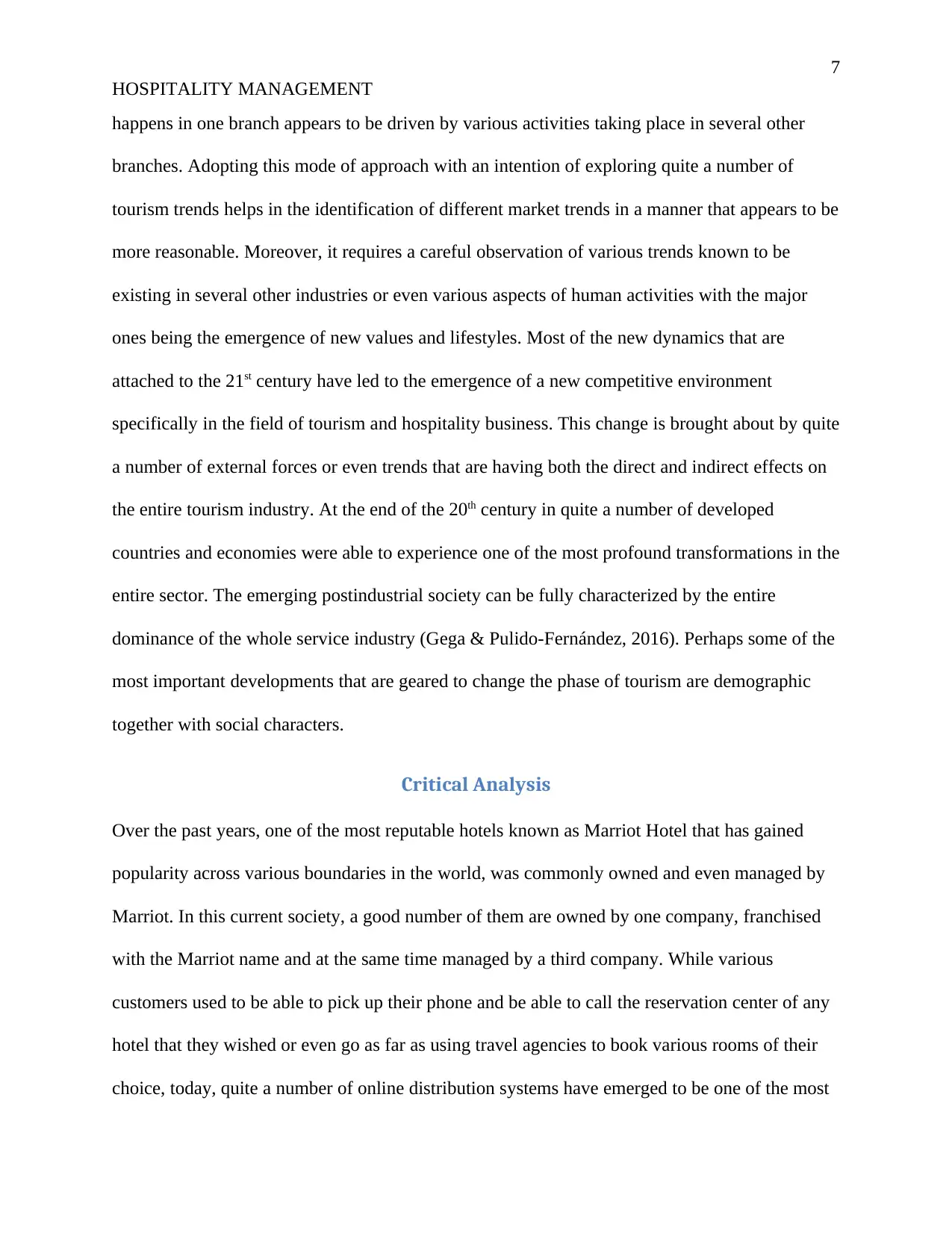
7
HOSPITALITY MANAGEMENT
happens in one branch appears to be driven by various activities taking place in several other
branches. Adopting this mode of approach with an intention of exploring quite a number of
tourism trends helps in the identification of different market trends in a manner that appears to be
more reasonable. Moreover, it requires a careful observation of various trends known to be
existing in several other industries or even various aspects of human activities with the major
ones being the emergence of new values and lifestyles. Most of the new dynamics that are
attached to the 21st century have led to the emergence of a new competitive environment
specifically in the field of tourism and hospitality business. This change is brought about by quite
a number of external forces or even trends that are having both the direct and indirect effects on
the entire tourism industry. At the end of the 20th century in quite a number of developed
countries and economies were able to experience one of the most profound transformations in the
entire sector. The emerging postindustrial society can be fully characterized by the entire
dominance of the whole service industry (Gega & Pulido-Fernández, 2016). Perhaps some of the
most important developments that are geared to change the phase of tourism are demographic
together with social characters.
Critical Analysis
Over the past years, one of the most reputable hotels known as Marriot Hotel that has gained
popularity across various boundaries in the world, was commonly owned and even managed by
Marriot. In this current society, a good number of them are owned by one company, franchised
with the Marriot name and at the same time managed by a third company. While various
customers used to be able to pick up their phone and be able to call the reservation center of any
hotel that they wished or even go as far as using travel agencies to book various rooms of their
choice, today, quite a number of online distribution systems have emerged to be one of the most
HOSPITALITY MANAGEMENT
happens in one branch appears to be driven by various activities taking place in several other
branches. Adopting this mode of approach with an intention of exploring quite a number of
tourism trends helps in the identification of different market trends in a manner that appears to be
more reasonable. Moreover, it requires a careful observation of various trends known to be
existing in several other industries or even various aspects of human activities with the major
ones being the emergence of new values and lifestyles. Most of the new dynamics that are
attached to the 21st century have led to the emergence of a new competitive environment
specifically in the field of tourism and hospitality business. This change is brought about by quite
a number of external forces or even trends that are having both the direct and indirect effects on
the entire tourism industry. At the end of the 20th century in quite a number of developed
countries and economies were able to experience one of the most profound transformations in the
entire sector. The emerging postindustrial society can be fully characterized by the entire
dominance of the whole service industry (Gega & Pulido-Fernández, 2016). Perhaps some of the
most important developments that are geared to change the phase of tourism are demographic
together with social characters.
Critical Analysis
Over the past years, one of the most reputable hotels known as Marriot Hotel that has gained
popularity across various boundaries in the world, was commonly owned and even managed by
Marriot. In this current society, a good number of them are owned by one company, franchised
with the Marriot name and at the same time managed by a third company. While various
customers used to be able to pick up their phone and be able to call the reservation center of any
hotel that they wished or even go as far as using travel agencies to book various rooms of their
choice, today, quite a number of online distribution systems have emerged to be one of the most
Paraphrase This Document
Need a fresh take? Get an instant paraphrase of this document with our AI Paraphraser
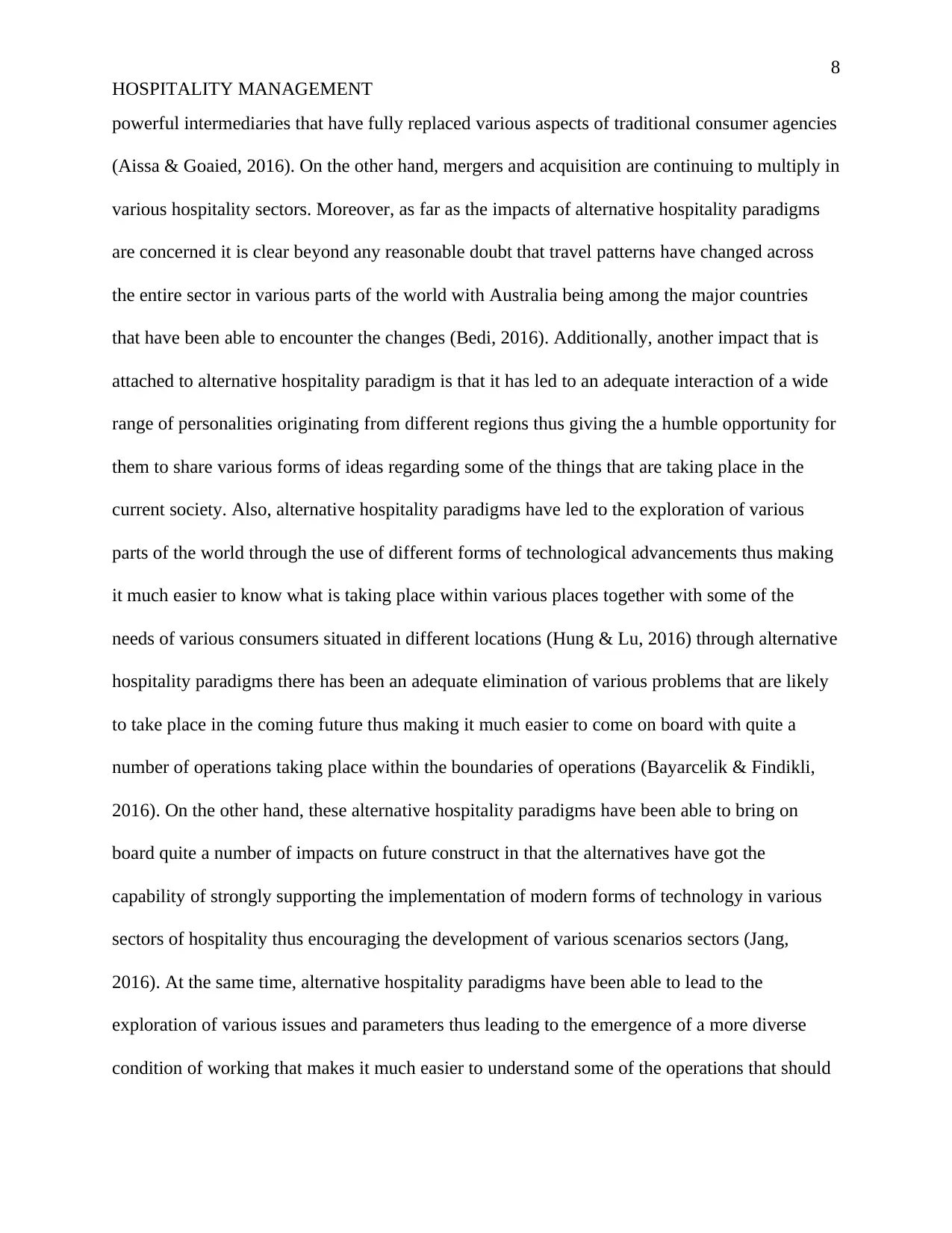
8
HOSPITALITY MANAGEMENT
powerful intermediaries that have fully replaced various aspects of traditional consumer agencies
(Aissa & Goaied, 2016). On the other hand, mergers and acquisition are continuing to multiply in
various hospitality sectors. Moreover, as far as the impacts of alternative hospitality paradigms
are concerned it is clear beyond any reasonable doubt that travel patterns have changed across
the entire sector in various parts of the world with Australia being among the major countries
that have been able to encounter the changes (Bedi, 2016). Additionally, another impact that is
attached to alternative hospitality paradigm is that it has led to an adequate interaction of a wide
range of personalities originating from different regions thus giving the a humble opportunity for
them to share various forms of ideas regarding some of the things that are taking place in the
current society. Also, alternative hospitality paradigms have led to the exploration of various
parts of the world through the use of different forms of technological advancements thus making
it much easier to know what is taking place within various places together with some of the
needs of various consumers situated in different locations (Hung & Lu, 2016) through alternative
hospitality paradigms there has been an adequate elimination of various problems that are likely
to take place in the coming future thus making it much easier to come on board with quite a
number of operations taking place within the boundaries of operations (Bayarcelik & Findikli,
2016). On the other hand, these alternative hospitality paradigms have been able to bring on
board quite a number of impacts on future construct in that the alternatives have got the
capability of strongly supporting the implementation of modern forms of technology in various
sectors of hospitality thus encouraging the development of various scenarios sectors (Jang,
2016). At the same time, alternative hospitality paradigms have been able to lead to the
exploration of various issues and parameters thus leading to the emergence of a more diverse
condition of working that makes it much easier to understand some of the operations that should
HOSPITALITY MANAGEMENT
powerful intermediaries that have fully replaced various aspects of traditional consumer agencies
(Aissa & Goaied, 2016). On the other hand, mergers and acquisition are continuing to multiply in
various hospitality sectors. Moreover, as far as the impacts of alternative hospitality paradigms
are concerned it is clear beyond any reasonable doubt that travel patterns have changed across
the entire sector in various parts of the world with Australia being among the major countries
that have been able to encounter the changes (Bedi, 2016). Additionally, another impact that is
attached to alternative hospitality paradigm is that it has led to an adequate interaction of a wide
range of personalities originating from different regions thus giving the a humble opportunity for
them to share various forms of ideas regarding some of the things that are taking place in the
current society. Also, alternative hospitality paradigms have led to the exploration of various
parts of the world through the use of different forms of technological advancements thus making
it much easier to know what is taking place within various places together with some of the
needs of various consumers situated in different locations (Hung & Lu, 2016) through alternative
hospitality paradigms there has been an adequate elimination of various problems that are likely
to take place in the coming future thus making it much easier to come on board with quite a
number of operations taking place within the boundaries of operations (Bayarcelik & Findikli,
2016). On the other hand, these alternative hospitality paradigms have been able to bring on
board quite a number of impacts on future construct in that the alternatives have got the
capability of strongly supporting the implementation of modern forms of technology in various
sectors of hospitality thus encouraging the development of various scenarios sectors (Jang,
2016). At the same time, alternative hospitality paradigms have been able to lead to the
exploration of various issues and parameters thus leading to the emergence of a more diverse
condition of working that makes it much easier to understand some of the operations that should
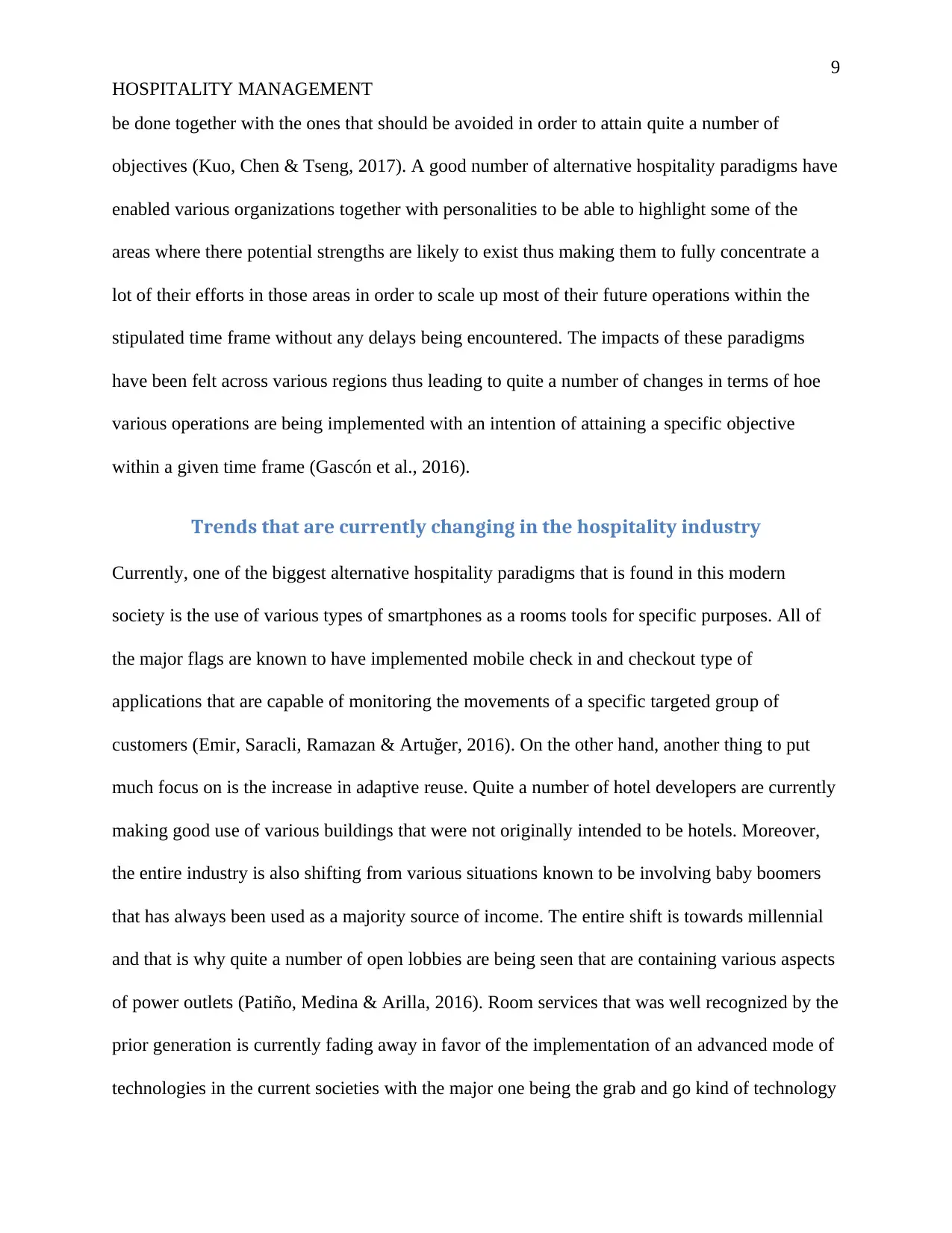
9
HOSPITALITY MANAGEMENT
be done together with the ones that should be avoided in order to attain quite a number of
objectives (Kuo, Chen & Tseng, 2017). A good number of alternative hospitality paradigms have
enabled various organizations together with personalities to be able to highlight some of the
areas where there potential strengths are likely to exist thus making them to fully concentrate a
lot of their efforts in those areas in order to scale up most of their future operations within the
stipulated time frame without any delays being encountered. The impacts of these paradigms
have been felt across various regions thus leading to quite a number of changes in terms of hoe
various operations are being implemented with an intention of attaining a specific objective
within a given time frame (Gascón et al., 2016).
Trends that are currently changing in the hospitality industry
Currently, one of the biggest alternative hospitality paradigms that is found in this modern
society is the use of various types of smartphones as a rooms tools for specific purposes. All of
the major flags are known to have implemented mobile check in and checkout type of
applications that are capable of monitoring the movements of a specific targeted group of
customers (Emir, Saracli, Ramazan & Artuğer, 2016). On the other hand, another thing to put
much focus on is the increase in adaptive reuse. Quite a number of hotel developers are currently
making good use of various buildings that were not originally intended to be hotels. Moreover,
the entire industry is also shifting from various situations known to be involving baby boomers
that has always been used as a majority source of income. The entire shift is towards millennial
and that is why quite a number of open lobbies are being seen that are containing various aspects
of power outlets (Patiño, Medina & Arilla, 2016). Room services that was well recognized by the
prior generation is currently fading away in favor of the implementation of an advanced mode of
technologies in the current societies with the major one being the grab and go kind of technology
HOSPITALITY MANAGEMENT
be done together with the ones that should be avoided in order to attain quite a number of
objectives (Kuo, Chen & Tseng, 2017). A good number of alternative hospitality paradigms have
enabled various organizations together with personalities to be able to highlight some of the
areas where there potential strengths are likely to exist thus making them to fully concentrate a
lot of their efforts in those areas in order to scale up most of their future operations within the
stipulated time frame without any delays being encountered. The impacts of these paradigms
have been felt across various regions thus leading to quite a number of changes in terms of hoe
various operations are being implemented with an intention of attaining a specific objective
within a given time frame (Gascón et al., 2016).
Trends that are currently changing in the hospitality industry
Currently, one of the biggest alternative hospitality paradigms that is found in this modern
society is the use of various types of smartphones as a rooms tools for specific purposes. All of
the major flags are known to have implemented mobile check in and checkout type of
applications that are capable of monitoring the movements of a specific targeted group of
customers (Emir, Saracli, Ramazan & Artuğer, 2016). On the other hand, another thing to put
much focus on is the increase in adaptive reuse. Quite a number of hotel developers are currently
making good use of various buildings that were not originally intended to be hotels. Moreover,
the entire industry is also shifting from various situations known to be involving baby boomers
that has always been used as a majority source of income. The entire shift is towards millennial
and that is why quite a number of open lobbies are being seen that are containing various aspects
of power outlets (Patiño, Medina & Arilla, 2016). Room services that was well recognized by the
prior generation is currently fading away in favor of the implementation of an advanced mode of
technologies in the current societies with the major one being the grab and go kind of technology
⊘ This is a preview!⊘
Do you want full access?
Subscribe today to unlock all pages.

Trusted by 1+ million students worldwide
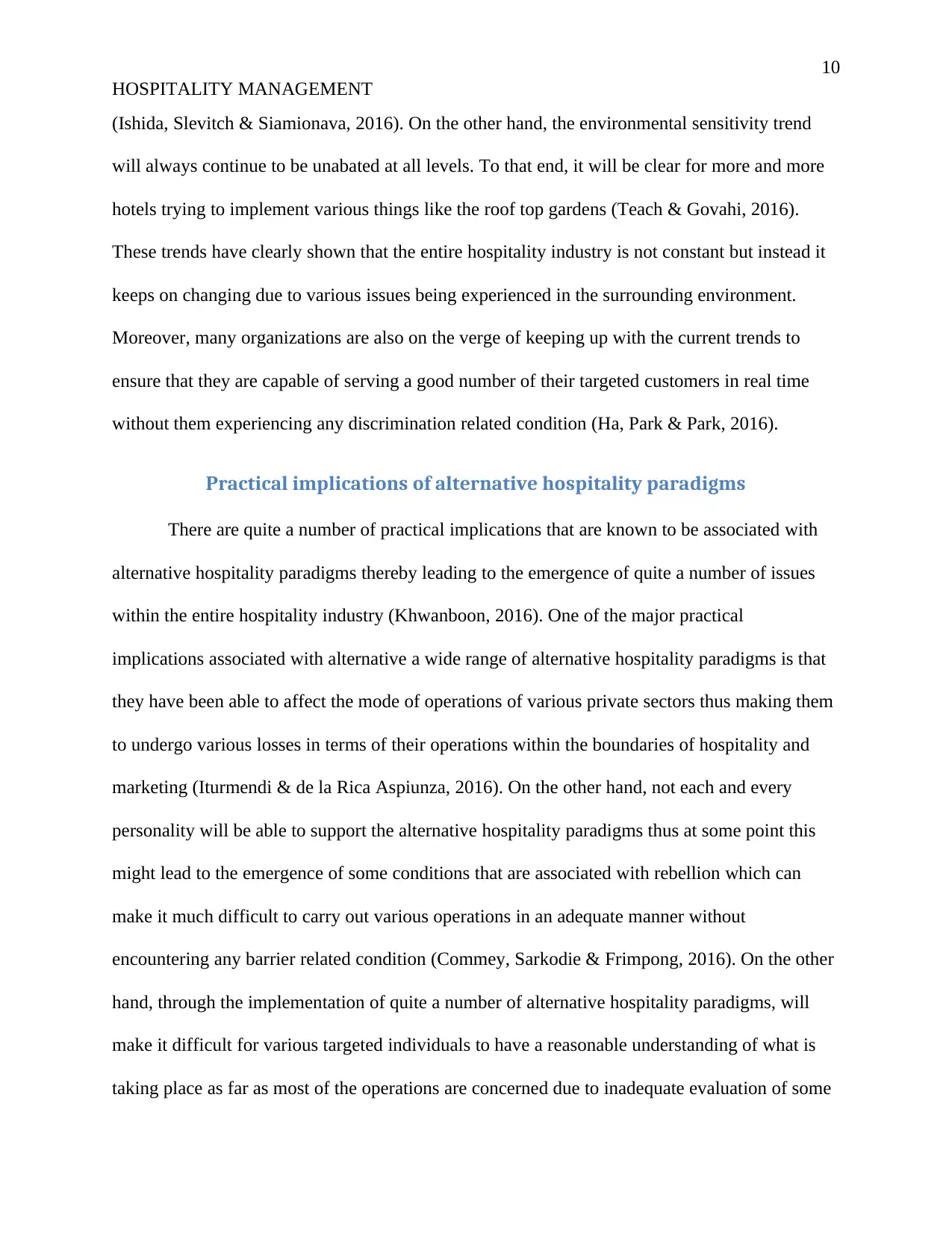
10
HOSPITALITY MANAGEMENT
(Ishida, Slevitch & Siamionava, 2016). On the other hand, the environmental sensitivity trend
will always continue to be unabated at all levels. To that end, it will be clear for more and more
hotels trying to implement various things like the roof top gardens (Teach & Govahi, 2016).
These trends have clearly shown that the entire hospitality industry is not constant but instead it
keeps on changing due to various issues being experienced in the surrounding environment.
Moreover, many organizations are also on the verge of keeping up with the current trends to
ensure that they are capable of serving a good number of their targeted customers in real time
without them experiencing any discrimination related condition (Ha, Park & Park, 2016).
Practical implications of alternative hospitality paradigms
There are quite a number of practical implications that are known to be associated with
alternative hospitality paradigms thereby leading to the emergence of quite a number of issues
within the entire hospitality industry (Khwanboon, 2016). One of the major practical
implications associated with alternative a wide range of alternative hospitality paradigms is that
they have been able to affect the mode of operations of various private sectors thus making them
to undergo various losses in terms of their operations within the boundaries of hospitality and
marketing (Iturmendi & de la Rica Aspiunza, 2016). On the other hand, not each and every
personality will be able to support the alternative hospitality paradigms thus at some point this
might lead to the emergence of some conditions that are associated with rebellion which can
make it much difficult to carry out various operations in an adequate manner without
encountering any barrier related condition (Commey, Sarkodie & Frimpong, 2016). On the other
hand, through the implementation of quite a number of alternative hospitality paradigms, will
make it difficult for various targeted individuals to have a reasonable understanding of what is
taking place as far as most of the operations are concerned due to inadequate evaluation of some
HOSPITALITY MANAGEMENT
(Ishida, Slevitch & Siamionava, 2016). On the other hand, the environmental sensitivity trend
will always continue to be unabated at all levels. To that end, it will be clear for more and more
hotels trying to implement various things like the roof top gardens (Teach & Govahi, 2016).
These trends have clearly shown that the entire hospitality industry is not constant but instead it
keeps on changing due to various issues being experienced in the surrounding environment.
Moreover, many organizations are also on the verge of keeping up with the current trends to
ensure that they are capable of serving a good number of their targeted customers in real time
without them experiencing any discrimination related condition (Ha, Park & Park, 2016).
Practical implications of alternative hospitality paradigms
There are quite a number of practical implications that are known to be associated with
alternative hospitality paradigms thereby leading to the emergence of quite a number of issues
within the entire hospitality industry (Khwanboon, 2016). One of the major practical
implications associated with alternative a wide range of alternative hospitality paradigms is that
they have been able to affect the mode of operations of various private sectors thus making them
to undergo various losses in terms of their operations within the boundaries of hospitality and
marketing (Iturmendi & de la Rica Aspiunza, 2016). On the other hand, not each and every
personality will be able to support the alternative hospitality paradigms thus at some point this
might lead to the emergence of some conditions that are associated with rebellion which can
make it much difficult to carry out various operations in an adequate manner without
encountering any barrier related condition (Commey, Sarkodie & Frimpong, 2016). On the other
hand, through the implementation of quite a number of alternative hospitality paradigms, will
make it difficult for various targeted individuals to have a reasonable understanding of what is
taking place as far as most of the operations are concerned due to inadequate evaluation of some
Paraphrase This Document
Need a fresh take? Get an instant paraphrase of this document with our AI Paraphraser
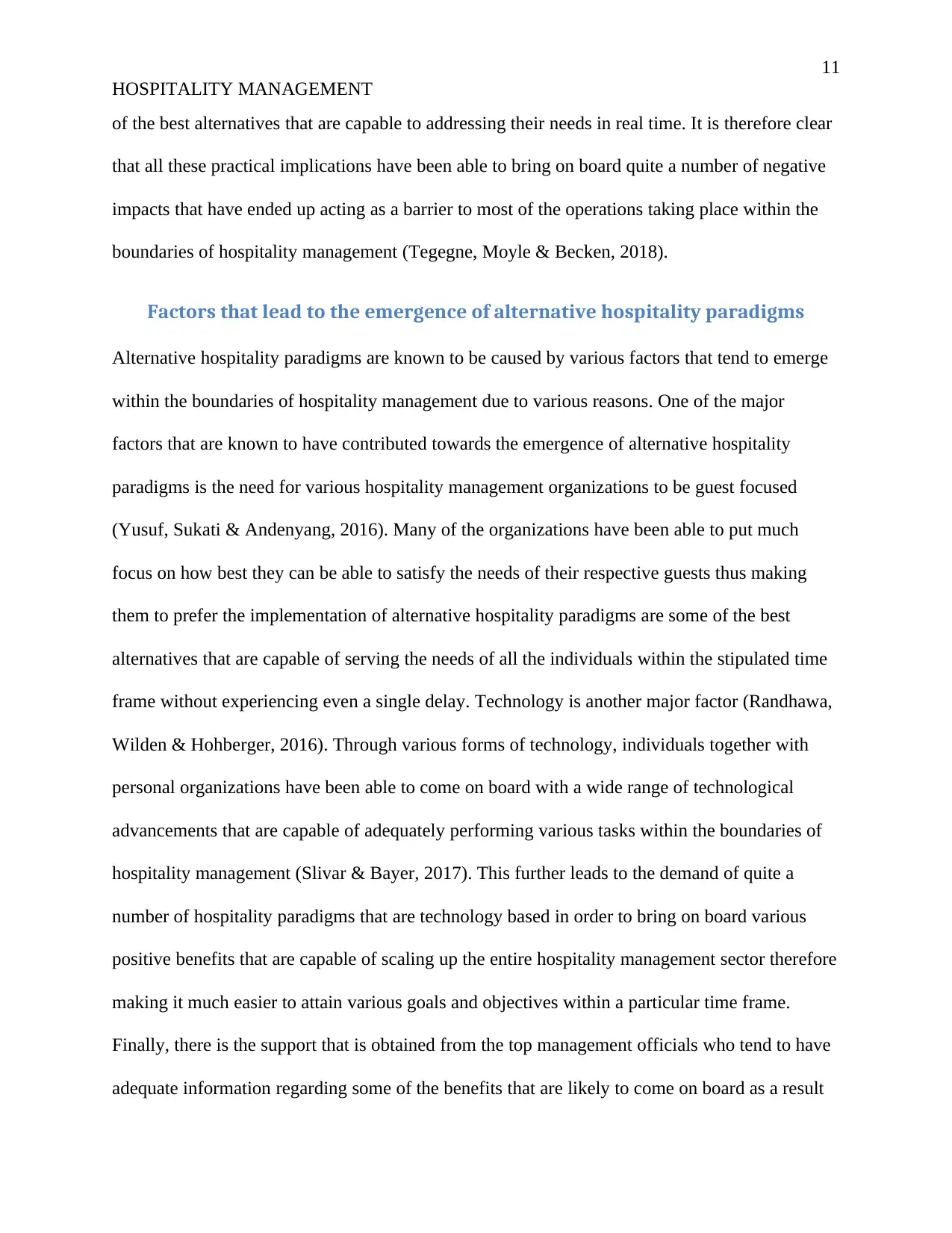
11
HOSPITALITY MANAGEMENT
of the best alternatives that are capable to addressing their needs in real time. It is therefore clear
that all these practical implications have been able to bring on board quite a number of negative
impacts that have ended up acting as a barrier to most of the operations taking place within the
boundaries of hospitality management (Tegegne, Moyle & Becken, 2018).
Factors that lead to the emergence of alternative hospitality paradigms
Alternative hospitality paradigms are known to be caused by various factors that tend to emerge
within the boundaries of hospitality management due to various reasons. One of the major
factors that are known to have contributed towards the emergence of alternative hospitality
paradigms is the need for various hospitality management organizations to be guest focused
(Yusuf, Sukati & Andenyang, 2016). Many of the organizations have been able to put much
focus on how best they can be able to satisfy the needs of their respective guests thus making
them to prefer the implementation of alternative hospitality paradigms are some of the best
alternatives that are capable of serving the needs of all the individuals within the stipulated time
frame without experiencing even a single delay. Technology is another major factor (Randhawa,
Wilden & Hohberger, 2016). Through various forms of technology, individuals together with
personal organizations have been able to come on board with a wide range of technological
advancements that are capable of adequately performing various tasks within the boundaries of
hospitality management (Slivar & Bayer, 2017). This further leads to the demand of quite a
number of hospitality paradigms that are technology based in order to bring on board various
positive benefits that are capable of scaling up the entire hospitality management sector therefore
making it much easier to attain various goals and objectives within a particular time frame.
Finally, there is the support that is obtained from the top management officials who tend to have
adequate information regarding some of the benefits that are likely to come on board as a result
HOSPITALITY MANAGEMENT
of the best alternatives that are capable to addressing their needs in real time. It is therefore clear
that all these practical implications have been able to bring on board quite a number of negative
impacts that have ended up acting as a barrier to most of the operations taking place within the
boundaries of hospitality management (Tegegne, Moyle & Becken, 2018).
Factors that lead to the emergence of alternative hospitality paradigms
Alternative hospitality paradigms are known to be caused by various factors that tend to emerge
within the boundaries of hospitality management due to various reasons. One of the major
factors that are known to have contributed towards the emergence of alternative hospitality
paradigms is the need for various hospitality management organizations to be guest focused
(Yusuf, Sukati & Andenyang, 2016). Many of the organizations have been able to put much
focus on how best they can be able to satisfy the needs of their respective guests thus making
them to prefer the implementation of alternative hospitality paradigms are some of the best
alternatives that are capable of serving the needs of all the individuals within the stipulated time
frame without experiencing even a single delay. Technology is another major factor (Randhawa,
Wilden & Hohberger, 2016). Through various forms of technology, individuals together with
personal organizations have been able to come on board with a wide range of technological
advancements that are capable of adequately performing various tasks within the boundaries of
hospitality management (Slivar & Bayer, 2017). This further leads to the demand of quite a
number of hospitality paradigms that are technology based in order to bring on board various
positive benefits that are capable of scaling up the entire hospitality management sector therefore
making it much easier to attain various goals and objectives within a particular time frame.
Finally, there is the support that is obtained from the top management officials who tend to have
adequate information regarding some of the benefits that are likely to come on board as a result
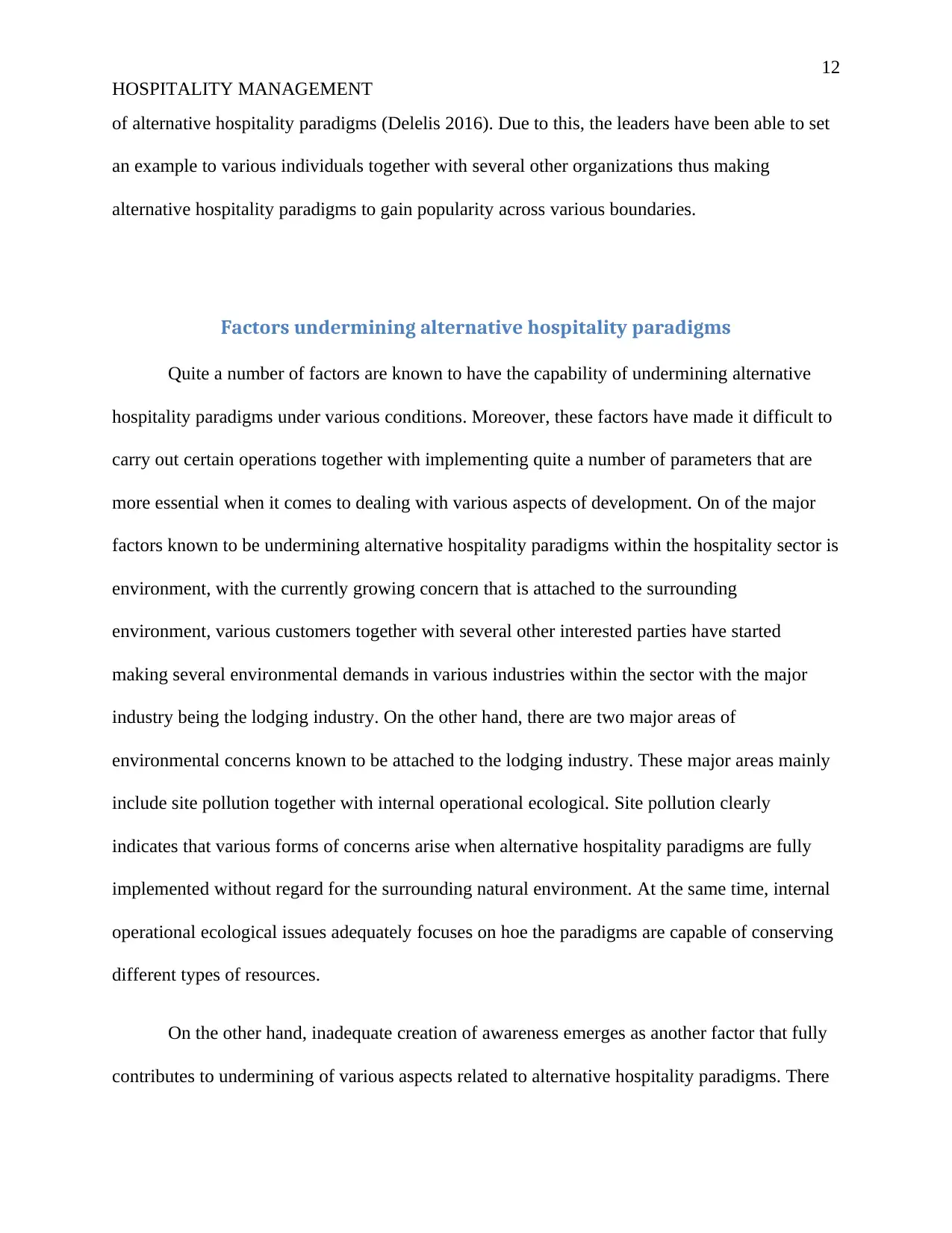
12
HOSPITALITY MANAGEMENT
of alternative hospitality paradigms (Delelis 2016). Due to this, the leaders have been able to set
an example to various individuals together with several other organizations thus making
alternative hospitality paradigms to gain popularity across various boundaries.
Factors undermining alternative hospitality paradigms
Quite a number of factors are known to have the capability of undermining alternative
hospitality paradigms under various conditions. Moreover, these factors have made it difficult to
carry out certain operations together with implementing quite a number of parameters that are
more essential when it comes to dealing with various aspects of development. On of the major
factors known to be undermining alternative hospitality paradigms within the hospitality sector is
environment, with the currently growing concern that is attached to the surrounding
environment, various customers together with several other interested parties have started
making several environmental demands in various industries within the sector with the major
industry being the lodging industry. On the other hand, there are two major areas of
environmental concerns known to be attached to the lodging industry. These major areas mainly
include site pollution together with internal operational ecological. Site pollution clearly
indicates that various forms of concerns arise when alternative hospitality paradigms are fully
implemented without regard for the surrounding natural environment. At the same time, internal
operational ecological issues adequately focuses on hoe the paradigms are capable of conserving
different types of resources.
On the other hand, inadequate creation of awareness emerges as another factor that fully
contributes to undermining of various aspects related to alternative hospitality paradigms. There
HOSPITALITY MANAGEMENT
of alternative hospitality paradigms (Delelis 2016). Due to this, the leaders have been able to set
an example to various individuals together with several other organizations thus making
alternative hospitality paradigms to gain popularity across various boundaries.
Factors undermining alternative hospitality paradigms
Quite a number of factors are known to have the capability of undermining alternative
hospitality paradigms under various conditions. Moreover, these factors have made it difficult to
carry out certain operations together with implementing quite a number of parameters that are
more essential when it comes to dealing with various aspects of development. On of the major
factors known to be undermining alternative hospitality paradigms within the hospitality sector is
environment, with the currently growing concern that is attached to the surrounding
environment, various customers together with several other interested parties have started
making several environmental demands in various industries within the sector with the major
industry being the lodging industry. On the other hand, there are two major areas of
environmental concerns known to be attached to the lodging industry. These major areas mainly
include site pollution together with internal operational ecological. Site pollution clearly
indicates that various forms of concerns arise when alternative hospitality paradigms are fully
implemented without regard for the surrounding natural environment. At the same time, internal
operational ecological issues adequately focuses on hoe the paradigms are capable of conserving
different types of resources.
On the other hand, inadequate creation of awareness emerges as another factor that fully
contributes to undermining of various aspects related to alternative hospitality paradigms. There
⊘ This is a preview!⊘
Do you want full access?
Subscribe today to unlock all pages.

Trusted by 1+ million students worldwide
1 out of 20
Related Documents
Your All-in-One AI-Powered Toolkit for Academic Success.
+13062052269
info@desklib.com
Available 24*7 on WhatsApp / Email
![[object Object]](/_next/static/media/star-bottom.7253800d.svg)
Unlock your academic potential
Copyright © 2020–2026 A2Z Services. All Rights Reserved. Developed and managed by ZUCOL.





